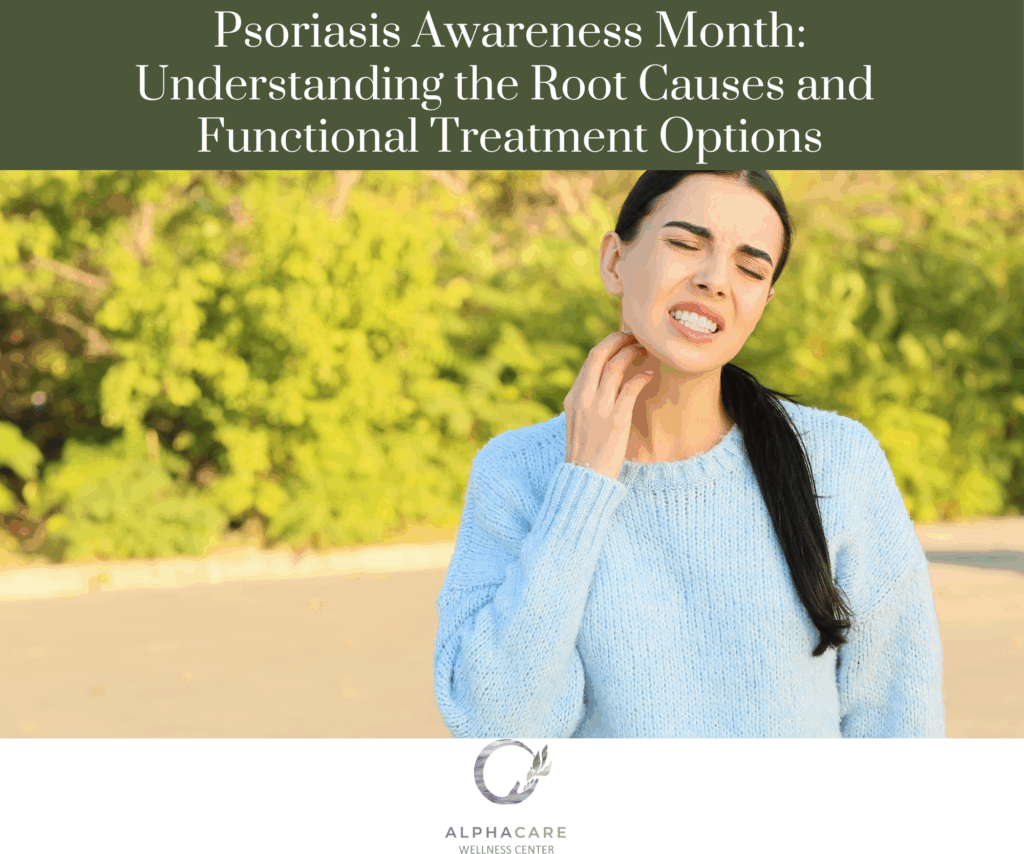
Introduction
Psoriasis is often mistaken for a simple skin condition, but in reality, it is a chronic autoimmune disease that affects the body far beyond the surface. Roughly 7.5 million Americans live with psoriasis, experiencing symptoms that can range from red, scaly patches on the skin to more complex issues such as joint pain when psoriatic arthritis develops. This Psoriasis Awareness Month, Alpha Care Wellness Center is shining a light on both conventional and functional medicine approaches—because managing psoriasis isn’t just about soothing the skin, it’s about addressing the deeper immune imbalances driving it.
What Is Psoriasis?
Psoriasis develops when the immune system sends faulty signals, causing skin cells to multiply much faster than normal. Instead of being shed naturally, these cells build up, leading to the hallmark patches, itching, and discomfort.
Common triggers include:
- Immune Dysregulation – An overactive immune system mistakenly targets healthy skin.
- Gut Imbalances – Issues like leaky gut syndrome and microbiome disruption are closely tied to autoimmune activity.
- Stress – Emotional or physical stress often leads to flare-ups.
- Environmental Triggers – Exposure to toxins, infections, and even weather changes can worsen symptoms.
Conventional Treatments
Dermatologists often recommend therapies to control symptoms, such as:
- Topical corticosteroids or vitamin D creams to calm inflammation.
- Light therapy (UVB) to slow skin cell turnover.
- Biologics that target specific immune pathways.
While these treatments can bring temporary relief and reduce flare frequency, they rarely address why psoriasis develops in the first place.
The Functional Medicine Approach
At Alpha Care Wellness Center, we take a deeper look at the root causes of autoimmunity and how they manifest as skin and systemic symptoms. Functional strategies often include:
- Gut Healing Protocols – Incorporating probiotics, elimination diets, and gut-healing nutrients to restore balance.
- Anti-Inflammatory Nutrition – Adding omega-3 fatty acids, turmeric, leafy greens, and antioxidant-rich foods to calm inflammation.
- Stress and Mind-Body Practices – Utilizing meditation, yoga, acupuncture, and breathwork to regulate the immune response.
- Detoxification Support – Supporting the liver and skin in clearing toxins that may exacerbate immune dysfunction.
Lifestyle Strategies for Daily Relief
Small, consistent lifestyle changes can help reduce psoriasis flares and improve comfort:
- Use fragrance-free skincare to minimize irritation.
- Bathe in lukewarm water with soothing oatmeal or Epsom salts.
- Limit or avoid alcohol, processed foods, and refined sugar.
- Incorporate gentle daily exercise to reduce systemic inflammation.
Q&A Section
Q: Can psoriasis be cured?
A: There is currently no cure, but both conventional and functional medicine approaches can significantly reduce flare-ups and improve overall quality of life.
Q: How does gut health impact psoriasis?
A: Since much of the immune system resides in the gut, inflammation or imbalance in the digestive tract can send “danger signals” that intensify autoimmune activity and worsen skin symptoms.




